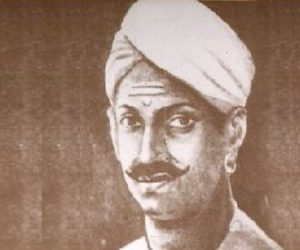On 29 March 1857, Mangal Pandey, a sepoy of the 34th Bengal Native Infantry (BNI) mutinied against his commanding officers of the East India Company. This event and Pandey’s subsequent punishment led to more resentment among the sepoys of the Bengal Army ultimately aiding in the Revolt of 1857.
This incident is an important event in modern Indian history because it ignited what eventually came to be called the first war of Indian independence. As IAS exams aspirants, you must be aware of the background and the impact of this act of rebellion by Mangal Pandey.
You can also download important modern history notes from the links below:
| First Indian Independence War | Tribal Uprisings in 18th and 19th Centuries |

Background of Mangal Pandey’s Revolt
- Mangal Pandey’s mutiny did not directly cause the Revolt of 1857 but it did intensify the feeling of anger and frustration that Indian sepoys harboured against their English masters.
- In February 1857, there was some tension in the 19th BNI because of fears that the cartridges of the Enfield P-53 rifle, which was to be introduced to the army that year, contained grease made from the fat of cows and pigs. This was offensive to both Hindus and Muslims.
- In the particular regiment of Pandey, a colonel’s wife had the Bible printed in Indian languages and had them distributed to the sepoys. This also contributed to the sepoys’ suspicions that they were being converted to Christianity.
- There was also unrest among the sepoys and the people at large because of the various annexations by the Company in which traditional Indian rulers were being deposed and toppled off their rightful thrones. In particular, the use of the Doctrine of Lapse by the Governor-General Dalhousie created a huge discontent among the Indians.
- 29-year old Mangal Pandey, a native of Ballia district in modern-day Uttar Pradesh, had joined the Bengal Army in 1849. He worked as a soldier in the 5th Company of the 34th
- On 29 March 1857 afternoon, Pandey was walking agitatedly in front of the guard room of the regiment. He seemed to be excited and was calling out to his fellow sepoys. He was armed with a loaded musket and threatened to shoot the first European he saw that day.
- He called out to the other soldiers, “Come out, the Europeans are here,” and “from biting these cartridges we shall become infidels”.
- On being informed about Pandey’s demeanour, Sergeant-Major James Hewson arrived on the scene. When he ordered the Indian officer Jemadar Ishwari Prasad to arrest Pandey, Prasad refused saying he could not arrest Pandey all by himself.
- When the Sergeant-Major’s adjutant Lieutenant Henry Baugh arrived on a horse, he was shot at by Pandey – this is referred to as the first gun fired on an Englishman during the course of the Revolt of 1857. Pandey missed hitting the lieutenant and hit his horse instead.
- After this, Pandey was fighting with Baugh when Hewson confronted him. He was knocked to the ground.
- All through, none of the soldiers came forward to help the officers. Only one soldier named Shaikh Paltu tried to assist the Englishmen. Paltu was attacked by stones and shoes by the other sepoys for trying to help the Englishmen.
- Paltu got hold of Pandey when the other soldiers warned of shooting him if he did not let go of the mutinying sepoy.
- Meanwhile, the commanding officer General Hearsey rode along to the scene with two officers. Pandey, on failing to incite all the men into open rebellion, tried to kill himself with his musket. But he only injured himself and was arrested.
- In a week, Mangal Pandey was put on trial and sentenced to death by hanging. During the trial, he told that he mutinied on his own free will and was not encouraged by any other sepoy.
- Jemadar Ishwari Prasad was also sentenced to death by hanging since he had ordered the other soldiers not to arrest Pandey.
- As per the sentence, Pandey was executed on 8 April 1857 and Prasad on 21 April.
- On May 6th, the entire 34th Regiment of the BNI was disbanded ‘with disgrace’. This was carried out because an investigation ‘revealed’ that the soldiers had not restrained a mutinying soldier.
- Sepoy Paltu was promoted to Havildar but he was murdered within the cantonment before the regiment was disbanded.
- Mangal Pandey’s act of rebellion was one of the major preceding events before the 1857 revolt.
Related links:
| The Impact Of The 1857 Revolt [Modern Indian History For UPSC] |
| Quick Notes on Revolt of 1857: Observations by Historians |
| Social Causes of 1857 Revolt |
Also on this day
1869: Birth of Sir Edwin Lutyens, architect of the Rashtrapati Bhavan, the Parliament of India and many other structures.
1943: Death of civil rights activist from Odisha, Laxman Nayak.
1999: A terrible earthquake hits Chamoli in Uttar Pradesh killing 103 people.
See previous ‘This Day in History’ here.
| UPSC 2023 | UPSC Mains GS 1 Strategy, Syllabus and Structure |
Comments